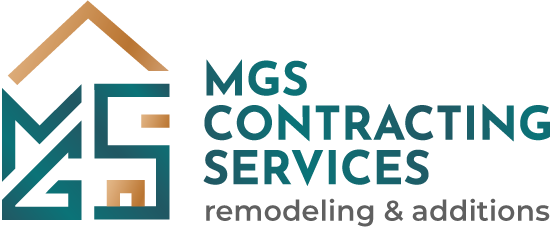When planning a bathroom remodel, one of the most crucial decisions is selecting the perfect flooring that combines functionality, durability, and style.
With numerous options available, including ceramic tile, vinyl flooring, natural stone, and engineered wood – it’s essential to know the pros and cons of each to make an informed decision that will serve your needs for years to come.
In this blog post, we’ll explore these popular choices in detail so you can select not only what looks great but also ensure optimum performance even in humid environments.
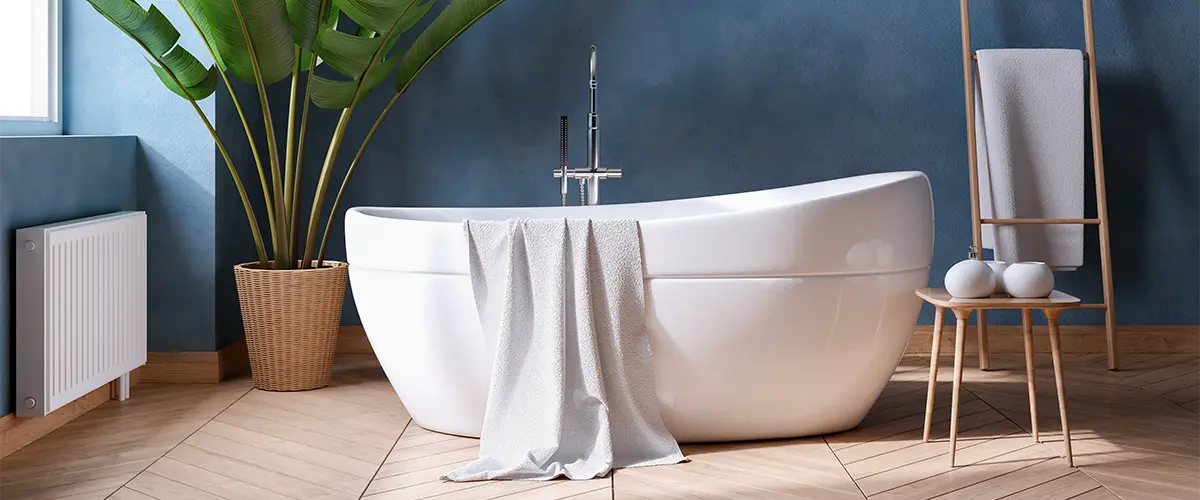
Key Takeaways
- The best bathroom flooring options are ceramic/porcelain tile, luxury vinyl flooring, and epoxy flooring.
- Each type of bathroom floor has its advantages and disadvantages. For example, ceramic/porcelain tiles are durable and easy to clean but can be expensive, while vinyl floors are affordable but not as durable tile.
- When choosing a bathroom floor material, homeowners should consider factors such as water-resistance, slip-resistance, durability, ease of maintenance, and budget.
- Your final decision regarding your bathroom floor will ultimately depend on personal style preferences and budget constraints.
Top Bathroom Flooring Options
Ceramic/Porcelain Tile Floor
Ceramic and porcelain tile floors are popular choices for homeowners seeking a durable, stylish, and functional bathroom flooring solution. Both materials are water-resistant and easy to clean, making them an excellent choice for bathrooms where spills and splashes are common occurrences.
While ceramic tiles are known for their affordability and versatility, porcelain tiles offer increased durability due to their denseness. Homeowners should consider textured porcelain tile as it provides slip resistance which adds an extra layer of safety while maintaining its luxurious appearance.
However, keep in mind that both ceramic and stone tiles can be on the pricier side when compared to other bathroom flooring options like vinyl or laminate – but they make up for it with unmatched resilience against water damage over time.
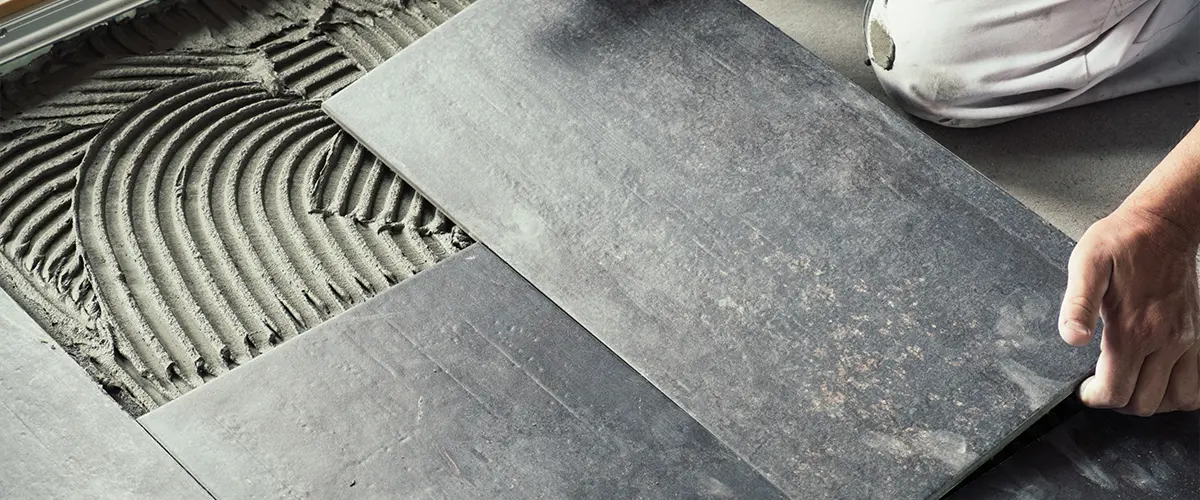
Vinyl Floor
Vinyl flooring has become increasingly popular among homeowners, thanks to its durability, affordability, and versatile design options.
Available as luxury vinyl plank (LVP) or sheet top luxury vinyl flooring, this bathroom flooring option provides a waterproof and slip-resistant surface that is perfect for busy households.
One of the major advantages of choosing vinyl flooring for your bathroom remodel is its easy-to-clean nature. A simple wipe with a damp cloth can keep the whole vinyl plank flooring throughout looking fresh and clean without requiring any special cleaning agents.
Moreover, many high-quality vinyl products are treated with antimicrobial coatings providing added protection against mold and mildew growth – an essential factor when considering a bathroom’s humid environment.
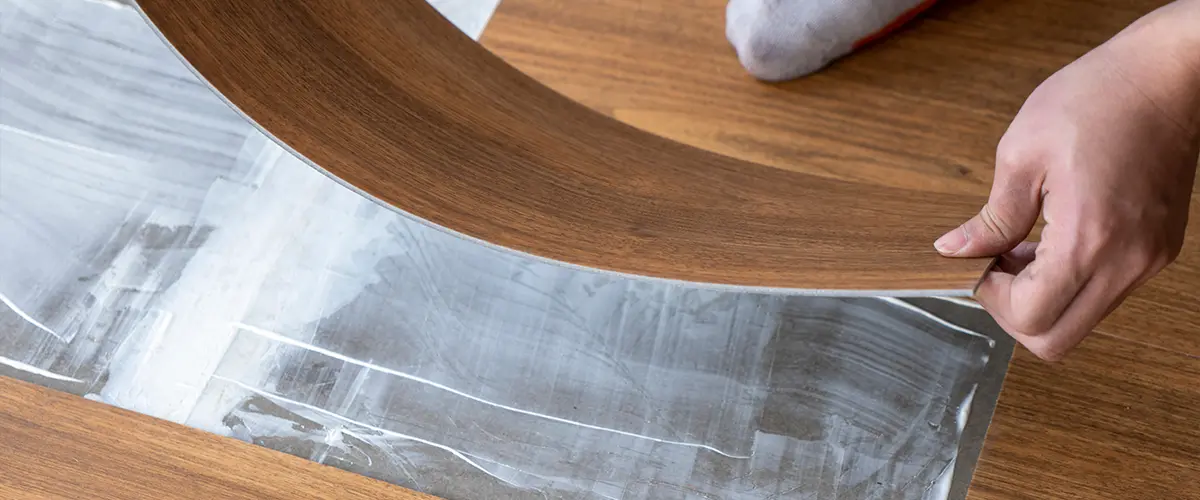
Natural Stone Floor
Natural stone flooring is a popular choice among homeowners seeking a luxurious and sophisticated bathroom design. Common materials for natural stone floors include marble, granite, slate, limestone, and travertine.
However, there are some considerations you should be aware of when choosing natural stone flooring. While it’s undoubtedly stylish and extremely durable, this type of flooring can also be more expensive than other options such as ceramic or porcelain tile.
Additionally, natural stone is porous, which means it may require sealing periodically to maintain water resistance. Some types of natural stones like marble might be prone to staining as well.
To ensure safety in water resistant flooring the bathroom environment where slip risks are high due to moisture exposure; opting for non-slip finishes on the surface of these stones is recommended along with proper installation using quality grout sealants for better waterproofing effect.
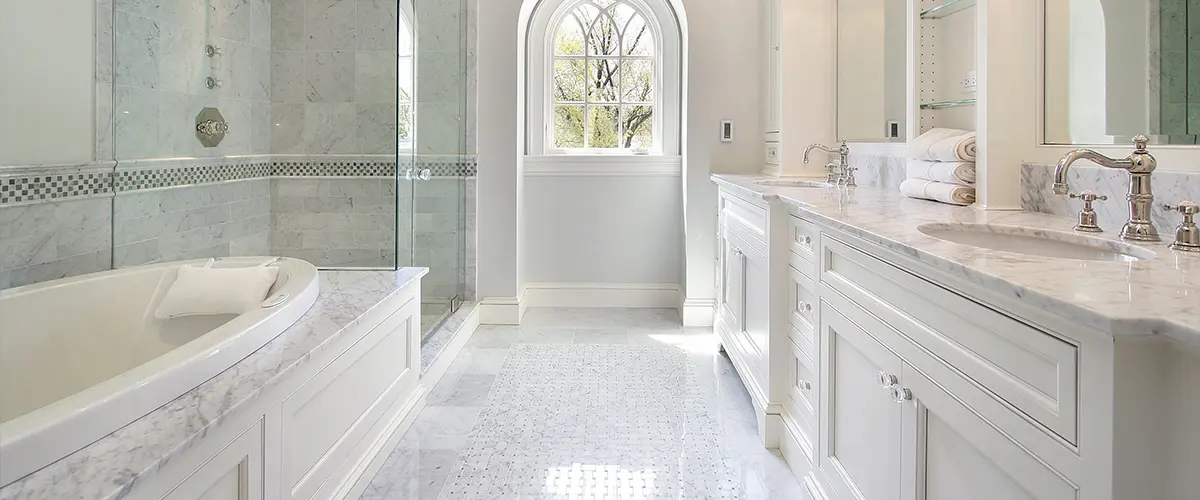
Engineered Wood Floor
Engineered wood flooring is a popular choice for homeowners because of its durability and affordability. Unlike hardwood floors, engineered wood flooring can withstand moisture without warping or swelling.
One of the most significant benefits of engineered wood flooring in bathrooms is that it gives the appearance of real hardwood at a lower cost. This type of flooring comes in various styles and finishes to complement any bathroom decor.
Engineered hardwood floors have a plywood core that makes them more resistant against water, but this limits the number of maximum refinishes to 2 – 3 times.
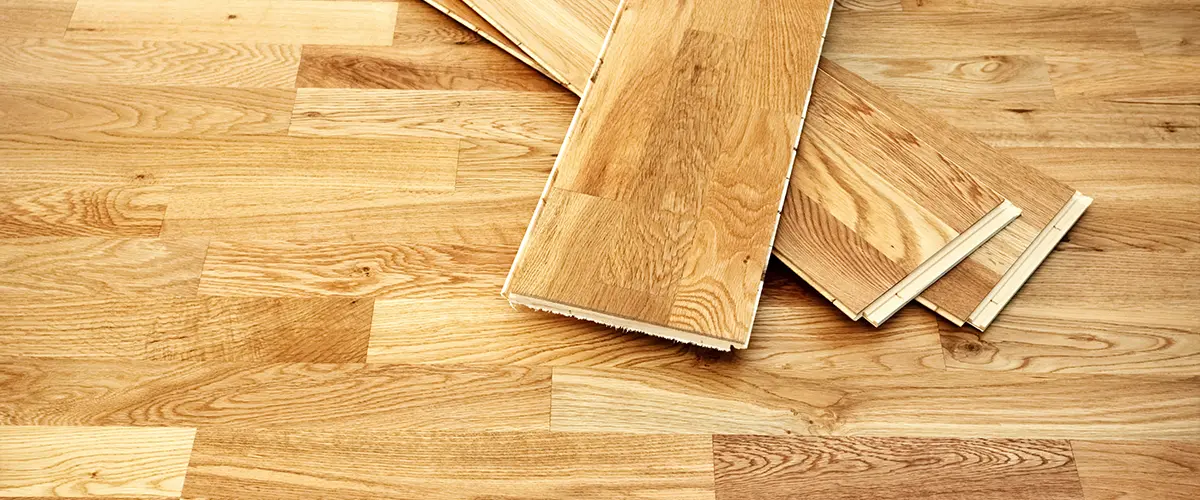
Hardwood Floor
Another great bathroom flooring option is hardwood. Hardwood floors create a warm and welcoming atmosphere that can add a touch of elegance to your bathroom. They are durable, easy to clean, and resistant to moisture if installed correctly.
However, it’s important to note that not all types of solid hardwood throughout are ideal for bathrooms as they’re susceptible to water damage over time. If you decide on this type of flooring, engineered wood is recommended due to its superior resistance against moisture compared to solid wood.
Additionally, using rugs or mats in high traffic areas can help protect your floor from scratches or spills.
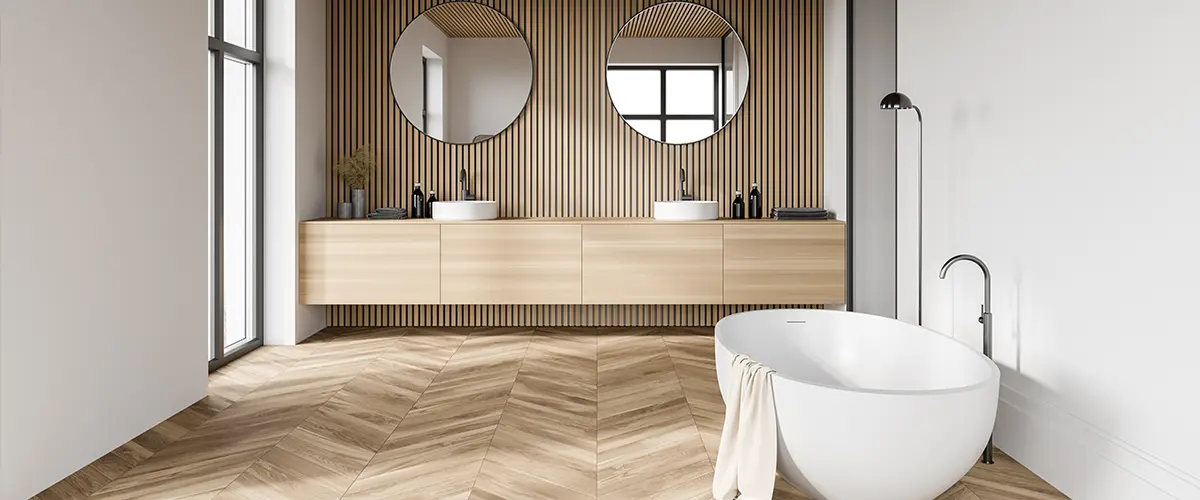
Pros And Cons Of Each Flooring Type
As a homeowner, it’s important to understand the advantages and disadvantages of each bathroom flooring option before making a decision. Here’s a breakdown of the pros and cons for some of the most popular choices:
| Type Of Flooring | Pros | Cons |
|---|---|---|
| Ceramic/Porcelain Tile Floor | 1. Water-resistant and durable 2. Low maintenance and easy to clean 3. Wide variety of styles, colors, and textures 4. Can be a textured surface for non-slip properties | 1. Can be expensive 2. Cold underfoot if not installed with radiant heat 3. Installation can be time-consuming and require a professional |
| Vinyl Floor | 1. Affordable and cost-effective 2. Waterproof and resistant to stains and scratches 3. Comfortable underfoot 4. Easy to install and replace | 1. Not as durable as other options 2. Limited interior design options compared to tile 3. Can be difficult to repair if damaged |
| Natural Stone Floor | 1. Luxurious and beautiful appearance 2. Durable and long-lasting 3. Unique patterns and textures | 1. Expensive to purchase and install 2. Requires regular sealing to prevent water damage 3. Can be slippery when wet |
| Engineered Wood Floor | 1. Provides a warm, natural appearance 2. More moisture-resistant than traditional hardwood 3. Easy to install | 1. Not fully waterproof 2. Can be expensive 3. May require professional installation |
| Hardwood Floor | 1. Adds warmth and elegance to a bathroom 2. Can be refinished multiple times for longevity | 1. Susceptible to water damage 2. Expensive to purchase and install 3. Requires regular maintenance |
| Epoxy Floor | 1. Seamless and waterproof 2. Durable and easy to clean 3. Can be customized with various colors and patterns | 1. Installation can be time-consuming and require a professional 2. May not provide the desired aesthetic for some homeowners 3. Can be slippery if not textured properly |
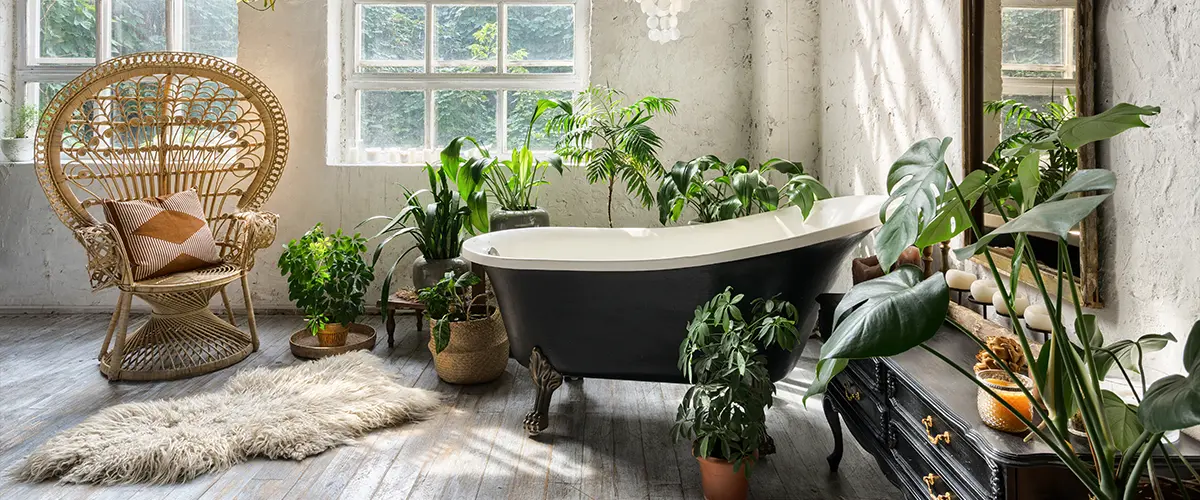
FAQ
Conclusion And Recommendation
After considering all the pros and cons of various bathroom flooring options, it’s clear that ceramic tile, porcelain tile, or luxury vinyl flooring are among the best choices for homeowners.
When choosing a material for your bathroom floor, consider factors like durability, water-resistance, slip-resistance, and ease of cleaning.
Ultimately though, the best choice will depend on your personal style preferences and budget constraints. Remember to choose a floor that not only suits your needs but also enhances the overall look of your bathroom remodel.
If you’re ready to work with a professional that’s sure to install a quality floor that’ll last for years without needing any repairs, MGS Contracting Services is your best bet! Give us a call at (571) 577-9554 or request your free quote now and let’s discuss your project!
